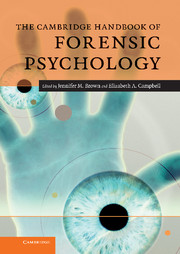Book contents
- The Cambridge Handbook of Forensic Psychology
- The Cambridge Handbook of Forensic Psychology
- Copyright page
- Dedication
- Contents
- Figures
- Tables
- Contributors
- Acknowledgements
- Forensic psychology:
- Part I Psychological underpinnings
- 1.1 Action system applied to forensic topics
- 1.2 Child and adolescent offending
- 1.3 Developmental perspectives on offending
- 1.4 The evolutionary psychology perspective
- 1.5 Eyewitness memory
- 1.6 Facet meta-theory
- 1.7 Head injury and offending
- 1.8 Investigative decision making
- 1.9 Investigative psychology
- 1.10 Personality theories and offending
- 1.11 Pragmatic psychology
- 1.12 Sexual offenders
- 1.13 Social psychological theories applied to forensic psychology topics
- 1.14 Theories of change
- 1.15 Therapeutic jurisprudence
- 1.16 Violent offending
- Part II Assessments
- Part III Interventions
- Part IV Psychology and criminal behaviour
- Part V Psychology and civil law
- Part VI Special topics
- Part VII Professional practice
- Part VIII Research practice
- Author index
- Subject index
1.7 - Head injury and offending
from Part I - Psychological underpinnings
Published online by Cambridge University Press: 06 July 2010
- The Cambridge Handbook of Forensic Psychology
- The Cambridge Handbook of Forensic Psychology
- Copyright page
- Dedication
- Contents
- Figures
- Tables
- Contributors
- Acknowledgements
- Forensic psychology:
- Part I Psychological underpinnings
- 1.1 Action system applied to forensic topics
- 1.2 Child and adolescent offending
- 1.3 Developmental perspectives on offending
- 1.4 The evolutionary psychology perspective
- 1.5 Eyewitness memory
- 1.6 Facet meta-theory
- 1.7 Head injury and offending
- 1.8 Investigative decision making
- 1.9 Investigative psychology
- 1.10 Personality theories and offending
- 1.11 Pragmatic psychology
- 1.12 Sexual offenders
- 1.13 Social psychological theories applied to forensic psychology topics
- 1.14 Theories of change
- 1.15 Therapeutic jurisprudence
- 1.16 Violent offending
- Part II Assessments
- Part III Interventions
- Part IV Psychology and criminal behaviour
- Part V Psychology and civil law
- Part VI Special topics
- Part VII Professional practice
- Part VIII Research practice
- Author index
- Subject index
Summary
- Type
- Chapter
- Information
- The Cambridge Handbook of Forensic Psychology , pp. 65 - 72Publisher: Cambridge University PressPrint publication year: 2010
- 1
- Cited by



